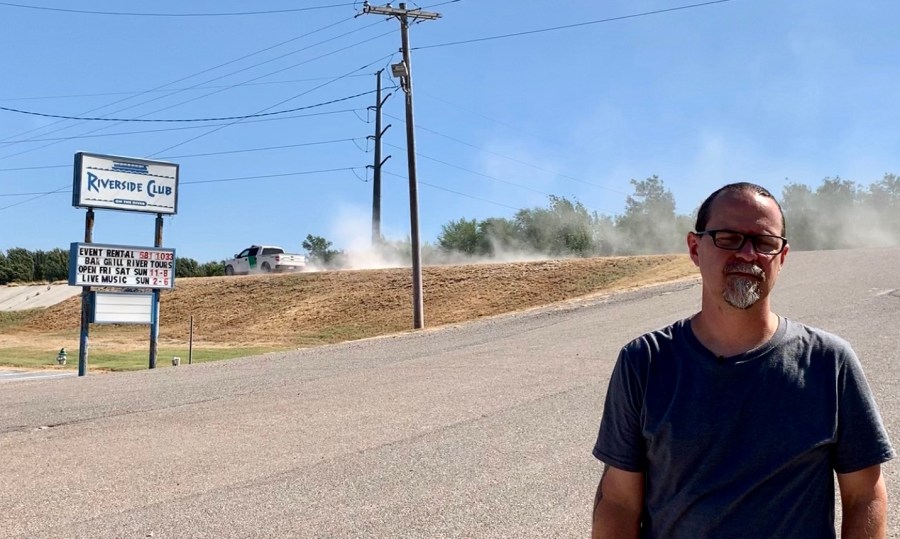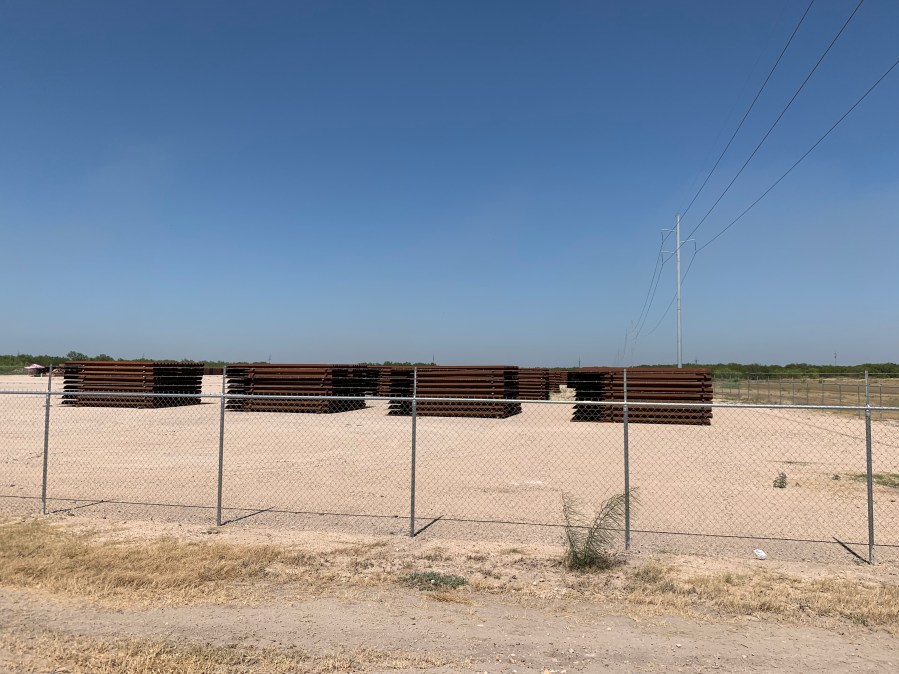MISSION, Texas (BorderReport.com) — Border Patrol trucks heavily patrolled a section of a border levee Thursday in western Hidalgo County, where U.S. Customs and Border Protection announced it has awarded a contract worth up to $304 million to a New Mexico company to begin building 11 miles of border wall to keep out immigrants and stem the flow of illegal drugs.
CBP, in conjunction with the U.S. Army Corps of Engineers, announced late Wednesday in a news release that Southwest Valley Constructors Company has been selected to build three non-contiguous segments of new border wall in Hidalgo County. The base contract amount is $80 million and could increase to $304 million with options.
Construction of additional border wall in South Texas is highly controversial, with opponents saying it will hurt the environment, trade and relations with Mexico, and ecotourism in the Rio Grande Valley.
Hidalgo County already has 54 miles of border levee walls, which were constructed between 2008-2010 and serve a dual purpose to help with flooding, officials say.
Congress has appropriated millions of dollars to build the additional 11 miles of border wall in Hidalgo County, but has exempted construction from these areas following much public outcry: Santa Ana National Wildlife Refuge; La Lomita Historical Park; Bentsen-Rio Grande Valley State Park; within or east of the Vista del Mar Ranch tract of the Lower Rio Grande Valley National Wildlife Refuge; and the National Butterfly Center.
Private property
Construction of new border wall in South Texas could begin as early as Sept. 30, “pending the availability of real estate,” the CBP press release said.
But that’s a big “if,” says Scott Nicol, former chairman of the Sierra Club’s Borderlands Committee and a member of the Lower Rio Grande Valley Sierra Club. Nicol says most of the land where the federal government is planning to build new sections of a border wall in Hidalgo County are privately owned.
“Most of it is private property so they can’t build on private property legally unless they have a court give them possession,” Nicol said.


Currently there are still dozens of unresolved eminent domain cases pending from landowners on the border here stemming from 2006 when the first section of border levee wall went up in these parts.
Nevertheless with so many environmental waivers already granted to hasten the building of the wall, Nicol said he is discouraged by the lengths that the Trump Administration has gone to build more border walls, and he said he would not be surprised to see new construction begin here soon.
“The border walls by their nature are destructive and the fact that the administration has waived every environmental law on the books to build these border walls shows that they don’t even think that they can build a border wall that’s not tremendously environmentally destructive,” Nicol said.
On the wrong side of the wall
Nicol spoke to Border Report on Thursday at the Riverside Club in Mission, Texas, a honky-tonk-style country bar situated on the banks of the Rio Grande that is especially popular with older Winter Texans. Once construction begins here, according to the government’s plans, the Riverside Club will end up on the other side of the wall.

“It’s unclear how people will access the Riverside Club. Or how landowners will be able to get to their farms to get to their properties,” Nicol said. “They might give them a gate. They might give them an access code to the gate. But how will their customers get through the gate? And will their customers want to get through that gate?”
CBP on Wednesday also announced that 25 gates would be built into the existing border levee wall system in the Border Patrol’s RGV Sector, which spans from Rio Grande City to Brownsville, Texas, and includes Hidalgo County. It’s uncertain from the news release exactly where those gates will be located.
“Once installed, the gates will serve as a persistent impediment to smuggling organizations while still allowing access for property owners, USBP, other local/state/federal officials, and local emergency responders,” CBP wrote. “These projects will improve the RGV Sector’s ability to impede and deny illegal border crossings and the drug and human smuggling activities of transnational criminal organizations.”
But Nicol says it will also impede customers from coming to the Riverside Club, and will hinder residents of nearby Chimney Park RV Resort from accessing their tailor homes.
RV trailer park to be cut off by wall
The new border wall will start atop a steep levee that abuts the RV Park, and will span eastward toward the western edge of Santa Ana Wildlife Refuge. With a 150-foot wide enforcement zone surrounding the new wall, to incorporate roads, lighting and sensor technology, several trailer plots likely will be removed to make way for construction.
The wall will be made of 18-foot-tall steel bollards that have a special metal plate at the top to prevent climbing. The 4-inch-wide steel post bollards will be spaced tightly together to prevent passage, but Nicol says it also will prevent wildlife from getting from one side to the other.
For more on the border wall design and specifics, please read this previous Border Report story.
Just a couple miles away from the RV park, off a highway and behind a razor wire fence, sit stacks of new bollards that will likely be used to build new sections of the controversial border wall in western Hidalgo County.

Southwest Valley Constructors, which was awarded the contract to build the new wall in Hidalgo County, was also awarded a $646 million contract in May to design and build a border wall near Tucson, Arizona. The Albuquerque-based company was founded in 2017 and has 99 employees.
Sandra Sanchez can be reached at SSanchez@BorderReport.com.









